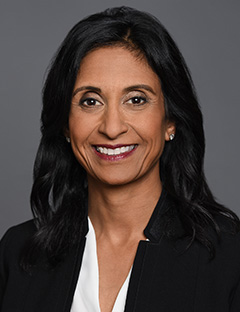June 15, 2020:
 Jyoti Patel, MD, professor of hematology/oncology and associate vice chair for clinical research in the Department of Medicine at Northwestern University Feinberg School of Medicine, has been appointed to represent the Robert H. Lurie Comprehensive Cancer Center of Northwestern University on the Big Ten Cancer Research Consortium Steering Committee.
Jyoti Patel, MD, professor of hematology/oncology and associate vice chair for clinical research in the Department of Medicine at Northwestern University Feinberg School of Medicine, has been appointed to represent the Robert H. Lurie Comprehensive Cancer Center of Northwestern University on the Big Ten Cancer Research Consortium Steering Committee.
The Steering Committee is composed of one researcher from each Big Ten CRC member institution and meets regularly to review activities of the consortium and decide matters of policy. The Steering Committee determines the criteria for approving concepts for development with the Big Ten CRC.
Dr. Patel, who also serves as medical director of thoracic oncology and assistant director for clinical research at the Lurie Cancer Center, is internationally recognized as an expert in lung and other thoracic cancers. Her research focuses on developing and evaluating novel molecular markers and therapeutics in non-small cell lung cancer. She has authored numerous publications and has had leadership roles in national thoracic cancer committees, including ASCO, IASLC, Alliance for Clinical Trials in Oncology, National Comprehensive Cancer Network, and Hoosier Cancer Research Network.
Born in Kenya, Dr. Patel moved to the United States with her family when she was a child. Her parents were both physicians. Shortly after they moved to Indiana, her father was diagnosed with pancreatic cancer and died in his early 40s. Her mother raised both Dr. Patel and her brother as a single mother while maintaining a busy clinical practice.
“Very early on, I had a great deal of respect for my mother, and was drawn toward science,” Dr. Patel said.
Her interests gravitated toward health policy and global health, and after spending some time in Africa again, she realized she enjoyed being in front of patients. She completed her medical degree at Indiana University School of Medicine, a residency at the McGaw Medical Center of Northwestern University, and a fellowship at Memorial Sloan Kettering Cancer Center.
Dr. Patel joined Northwestern in 2003, where she served as the thoracic oncology program leader at the Lurie Cancer Center. She then moved to the University of Chicago for three years, as professor of medicine and director of thoracic oncology, before returning to Northwestern in 2019.
Dr. Patel has seen dramatic changes in thoracic oncology over the past 20 years.
“When I first started, overall survival was less than a year, on average, for patients with lung cancer,” Dr. Patel said. “Now we’re seeing survival in certain subgroups over five years. We’re seeing patients who have been treated with immunotherapy with no evidence of disease and landmark analyses at three years, some even five years. With deeper understanding of the biology of cancer, the investment in translational science, smarter and more efficient clinical trials, and partnering with patients, we’ve been able to make huge in-roads.”
She says she is grateful to serve on the Big Ten CRC Steering Committee and to continue to strengthen opportunities for collaboration between member institutions.
“Through the Big Ten CRC, one has multiple opportunities for feedback, for mentorship, collaboration, and lifelong friendship,” Dr. Patel said. “It is about working together, helping each other, and prioritizing the best science and what we think are the most meaningful outcomes to patients. At the end of the day, that’s what drives all of us.”
About the Big Ten Cancer Research Consortium: The Big Ten Cancer Research Consortium was created in 2013 to transform the conduct of cancer research through collaborative, hypothesis-driven, highly translational oncology trials that leverage the scientific and clinical expertise of Big Ten universities. The goal of the Big Ten Cancer Research Consortium is to create a unique team-research culture to drive science rapidly from ideas to new approaches to cancer treatment. Within this innovative environment, today’s research leaders collaborate with and mentor the research leaders of tomorrow with the unified goal of improving the lives of all patients with cancer.
About the Big Ten Conference: The Big Ten Conference is an association of world-class universities whose member institutions share a common mission of research, graduate, professional and undergraduate teaching and public service. Founded in 1896, the Big Ten has sustained a comprehensive set of shared practices and policies that enforce the priority of academics in the lives of students competing in intercollegiate athletics and emphasize the values of integrity, fairness and competitiveness. The broad-based programs of the 14 Big Ten institutions will provide over $200 million in direct financial support to more than 9,800 students for more than 11,000 participation opportunities on 350 teams in 42 different sports. The Big Ten sponsors 28 official conference sports, 14 for men and 14 for women, including the addition of men’s ice hockey and men’s and women’s lacrosse since 2013. For more information, visit www.bigten.org.
















Subscribe to the Big Ten CRC Newsletter X
X Facebook
Facebook YouTube
YouTube